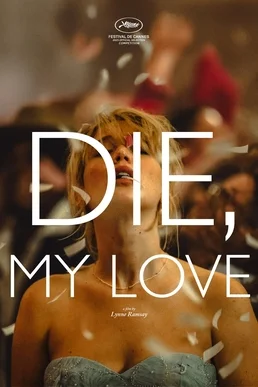Die, My Love (2025)
Die, My Love (2025) – A Haunting Exploration of Maternal Despair
Director: Lynne Ramsay
Screenplay: Lynne Ramsay, Enda Walsh, Alice Birch
Based on: Die, My Love by Ariana Harwicz
Starring: Jennifer Lawrence, Robert Pattinson, LaKeith Stanfield, Sissy Spacek, Nick Nolte
Cinematography: Seamus McGarvey
Runtime: 118 minutes
Language: English
Genre: Psychological Drama / Dark Comedy
Release: Premiered at the 2025 Cannes Film Festival on May 17
📝 Synopsis
Set in the vast and lonely plains of Montana, Die, My Love tells the story of Grace (Jennifer Lawrence), a woman sinking into a dark spiral of postpartum depression. As the expectations of motherhood begin to crush her spirit, her sense of identity disintegrates. Her mental decline is rendered with poetic intensity and chilling realism, blurring the lines between sanity, fantasy, and instinctual rebellion.
🎬 Performances
Jennifer Lawrence as Grace delivers an astonishingly raw and brave performance. She embodies maternal instability and emotional collapse with precision. Critics hailed it as her most vulnerable role to date.
Robert Pattinson as Jackson presents a husband torn between confusion and helplessness. His subtle gestures speak volumes of silent suffering.
LaKeith Stanfield as Karl, the mysterious stranger, acts as both temptation and trauma-trigger, expertly crafting an emotional mirage that reflects Grace’s chaotic inner world.
Sissy Spacek and Nick Nolte shine in their roles as Jackson’s parents, whose stoic Midwestern personalities add generational tension.
🎥 Direction and Cinematography
Lynne Ramsay pulls no punches in her depiction of psychological decline. She uses confined framing, natural lighting, and jarring dream sequences to embed the audience inside Grace’s unraveling psyche. The 35mm film stock and 1.33:1 ratio give it a voyeuristic, suffocating aesthetic.
🎵 Sound Design and Score
With whispering winds, humming lullabies twisted into horror, and dead silences, the sound design externalizes Grace’s mental fragmentation. Ramsay even sings a haunting version of "Love Will Tear Us Apart" over the end credits, capturing the film's emotional core.
🕵️ Hidden Facts
- Scorsese Connection: Martin Scorsese personally recommended the novel to Jennifer Lawrence, who later acquired the rights through her production company.
- Ramsay's Rewrite: The script went through four rewrites, including input from playwright Enda Walsh and screenwriter Alice Birch (Normal People), to nail the psychological authenticity.
- Real Therapy Sessions: Jennifer Lawrence attended actual group therapy sessions for new mothers to prepare for the role.
- Visual Echoes: Certain shots mirror iconic scenes from Repulsion and Persona, paying homage to cinema's psychological classics.
- Symbolism: The recurring motif of a red fox represents both predatory instinct and maternal abandon.
✈️ Deleted Scenes
- Grace’s Backstory: A 12-minute sequence showing Grace’s pre-baby life and her dreams of becoming a travel photographer was cut to maintain the film's claustrophobic focus.
- The Lake Scene: A surreal underwater dream where Grace sees her baby floating with glowing eyes. Ramsay thought it "too literal" for the final cut.
- Jackson’s Breakdown: A solo scene where Jackson weeps in his car while listening to his wedding vows. Cut for pacing reasons.
😂 Funny Moments On Set
- Dance Class Embarrassment: Ramsay sent Lawrence and Pattinson to a ballroom dancing class to break the ice. Pattinson reportedly fell over during a waltz and joked, "I'm more of a Twilight dancer."
- Fake Baby Prank: During a tense hospital shoot, LaKeith Stanfield swapped the realistic prop baby with a SpongeBob doll. Jennifer Lawrence cracked up mid-scene.
- Frozen Pants Incident: Filming in sub-zero Calgary, Lawrence’s costume pants froze stiff during a long take. Ramsay yelled "Keep rolling! It's metaphorical!"
🔍 Themes & Symbolism
- Motherhood and Mental Health: The film is unflinching in its portrayal of postpartum depression, challenging idealized notions of maternal instinct.
- Desire vs. Responsibility: Grace's yearning for freedom clashes violently with her roles as wife and mother.
- Nature and Isolation: The harsh landscape mirrors Grace’s inner barrenness. The quiet is not peace; it’s pressure.
🌟 Final Verdict
Die, My Love is not just a film—it's an experience. It drags you into the discomfort of madness and the agony of unmet expectations. It's brave, bleak, beautiful, and profoundly necessary in its depiction of the rarely spoken truths about motherhood.
Rating: 5/5 ⭐
This film will stay with you—not for its horror, but for how scarily real it all feels.
Written exclusively for film enthusiasts who crave deep psychological realism.




Comments
Post a Comment